Kenneth Atchity's Blog, page 12
November 15, 2024
Story Merchant Author Ama Adair Featured in VIRGINIAN-PILOT!
 Ama Adair stands next to a bookshelf at her home in Virginia Beach, with a copy of her book "Shadow Game" in the background. (Courtesy of Ama Adair)
Ama Adair stands next to a bookshelf at her home in Virginia Beach, with a copy of her book "Shadow Game" in the background. (Courtesy of Ama Adair)Ama Adair first got the idea for her book series on a dark, narrow road in Baghdad, Iraq, as her military convoy drove past seemingly abandoned buildings and the hair on the back of her neck stood on end.
A Navy chief warrant officer specializing in counterintelligence and human intelligence, Adair didn’t begin writing until about six years after that 2010 deployment. But her vivid real-life memories helped shape her thriller “Shadow Game,” published in October under the name A.M. Adair. The book is the opener in a planned three- or four-part series.
“Shadow Game” features a strong female protagonist named Elle Anderson, a CIA operative who leads an elite team charged with destroying a terrorist organization.
“No damsels in distress or princesses here,” says Adair, a Virginia Beach resident. “She is a powerful, intelligent woman who is not very emotionally driven. She certainly doesn’t need rescuing. I would love if my daughter and other girls could see more characters like her.”
Ama Adair's book, which published in October, is the first book in a four-part series. (Courtesy of Ama Adair)
 As a first-time author, Adair, 40, had a steep learning curve with the writing, editing and publication process. And as a mother with a full-time job, she had to squeeze much of her writing into two- to three-hour sessions on evenings and weekends. Her husband Jake, an active-duty Navy chief, took over parenting whenever he could.
As a first-time author, Adair, 40, had a steep learning curve with the writing, editing and publication process. And as a mother with a full-time job, she had to squeeze much of her writing into two- to three-hour sessions on evenings and weekends. Her husband Jake, an active-duty Navy chief, took over parenting whenever he could.“Luckily, military life trained me for not sleeping a whole lot,” Adair says. “Things got easier once I let my characters take over and stopped trying to force the plot. A lot of my own ideas for how to get to the key scenes I wanted kind of disappeared, which made it more fun.”
Although the series is fictional, Adair’s 10 overseas deployments — including four in Iraq and one in Afghanistan — served as background research. In fact, creating Anderson’s story helped Adair address some of her own feelings: “Elle goes through some post-traumatic stress and a lot of physical and emotional challenges. I found it very therapeutic for me.”
An Ohio native, Adair joined the Navy shortly after 9/11 and has lived in Virginia Beach since 2005. While always interested in reading and journaling, she had no writing training beyond school classes and the formal military papers required in her job.
After years of considering a novel, Adair typed the first chapters of “Shadow Game” on her laptop during downtime on a 2016 deployment in Italy. A self-described introvert, she found the solo pursuit a perfect fit.
Back home, Adair often settled down to write in a favorite recliner after her kids Arya, now 7, and later baby Finn, born last April, were asleep for the night. She also has juggled work toward an online bachelor’s degree in intelligence studies through American Military University.
The 300-page “Shadow Game” took about nine months to finish, followed by a similarly long editing process. “It was often me being too wordy,” she says. “I discovered that having too many details actually slows down the tempo.”
Since Adair is active-duty military, the Pentagon had to screen her thriller before publication. “Shadow Game” was released through Kindle Direct Publishing with representation by Story Merchant Books, a company that facilitates such independent publishing. It is currently for sale exclusively on Amazon.
“I was a complete nerd when it came out,” Adair says with a laugh. “I immediately ordered like five copies of it, plus the Kindle edition. I was in awe holding it.”
Adair is almost finished with book two of the series, “The Deeper Shadow,” which she started in 2017 but put on pause during her most recent pregnancy and Finn’s newborn months. She hopes to publish it in the summer and then immediately dive into book three. Once she retires from the military, her dream is to be a full-time writer.
“In a perfect world, I’d do a lot of hanging out with my laptop and some good cups of coffee,” she says. “I just want to let my imagination keep taking off.”
Alison Johnson, ajohnsondp@yahoo.com
Read more
November 13, 2024
What Readers are Saying About Leo Daughtry's Talmadge Farm
"The characters in this book could be people who lived; many like them certainly did. It was a time of innovation, which Daughtry made clear, but also a time changing values. For those people caught between the old and the new, it could be hard. Daughtry did an amazing job of putting that conundrum on paper/audio, when he wrote this book. It is heart-breaking in many ways, and not just the obvious, but for those who are not able to change, and really shouldn’t have had to in many ways. A man brought to his knees, through his own fault, because of culture change is a sad thing. Daughtry showed it with grace and kindness."


AVAILABLE ON AMAZON
"Talmadge Farm has often been described as a love letter to the South. Daughtry says, “Despite what the South has done and is doing, everybody loves the South. The South has a charm about it, and this book talks about the good parts of the South, how good the people are, and what the South has meant to so many of us… It’s a love story in many respects.”
It’s 1957, and tobacco is king. Wealthy landowner Gordon Talmadge enjoys the lavish lifestyle he inherited but doesn’t like getting his hands dirty; he leaves that to the two sharecroppers – one white, one Black – who farm his tobacco but have bigger dreams for their own children. While Gordon takes no interest in the lives of his tenant farmers, a brutal attack between his son and the sharecropper children sets off a chain of events that leaves no one unscathed. Over the span of a decade, Gordon struggles to hold on to his family’s legacy as the old order makes way for a New South.
November 8, 2024
ELLERY QUEEN’S MYSTERY MAGAZINE Features Dennis Palumbo's "The Patient" and My Patients!
“The Patient” and My Patients (by Dennis Palumbo, M.A., MFT)
Dennis Palumbo, M.A., MFT is a writer and licensed psychotherapist in private practice, specializing in creative issues, primarily in the entertainment industry. His award-winning series of mystery thrillers—Mirror Image, Fever Dream, Night Terrors, Phantom Limb, Head Wounds and the latest, Panic Attack—feature psychologist and trauma expert Daniel Rinaldi. He’s also the author of Writing From the Inside Out, as well as a collection of mystery short stories, From Crime to Crime. Recently he served as Consulting Producer on the Hulu limited series The Patient, and here (in an article first published in the journal Capital Psychiatry) he tells us about how the play out of the television crime drama affected his real-life patients.

After seventeen years as a Hollywood screenwriter (the film My Favorite Year; the sitcom Welcome Back, Kotter, etc.), I retired from show business and have been a licensed psychotherapist in private practice for over thirty years. During this time, my writing has been confined to articles and reviews, as well as a series of mystery novels whose protagonist is a psychologist. My point is, it’s been so long since I was a dues-paying member of the Hollywood industry that I was quite surprised to hear from the team of Joel Fields and Joe Weisberg. Writers of the award-winning TV series The Americans, they’d reached out to me to act as advisor on a new show they were developing. Called The Patient, it was about a serial killer who kidnaps and holds hostage a well-known therapist, in hopes that he can “cure” the killer of his homicidal urges.
Apparently, my former career as a script writer and my current one as a therapist prompted them to see me as a reasonable person to act as consultant on the new series. Essentially, what they wanted was for me to vet each episode’s scripts for clinical accuracy and to “make sure the therapist sounded like a therapist”—or as much like one as possible given the bizarre circumstances of the show’s premise.
Over the coming months, I did my best to keep the narrative within the range of plausibility, including suggesting the occasional line of dialogue or therapeutic interpretation. Just as we were finishing the script for the last episode, it was announced that Steve Carell had been cast as the therapist. A wonderful actor, he’d been given a salt-and-pepper beard and glasses. Whether or not it was conscious on the writers’ part, he looked somewhat like me. Which, at the time, I just found amusing.
My working relationship with Fields and Weisberg was one of the most pleasant professional experiences of my life. Moreover, the two writers were very gracious about my contribution when doing PR interviews leading up to the series premiere. During one such interview, when writing up the story for Newsweek, the reporter off-handedly mentioned that Carell’s character looked like me.
It wasn’t until the series began airing on Hulu that the ramifications of this became apparent in my therapy practice. A number of patients who’d begun watching the show pointed out that Carell’s therapist character looked a lot like me, and on occasion even sounded like me. (No surprise, since I’d suggested some of the therapeutic comments the therapist made.) Naturally, I had to process this with these patients, some of whom were quite upset at seeing the therapist chained to a bed, helpless. More than one half-jokingly worried that the series’ premise would give “some crazy person” the idea of kidnapping me. Did I feel I was in danger? they asked. I answered honestly that I didn’t, while privately wondering why I’d never even entertained that idea when working on the show.
Moreover, had I been unforgivably clueless in not anticipating this reaction from my patients? I reminded myself that Steve Carell hadn’t been cast until the series’ scripts were almost finished, that I had no idea he’d be playing the therapist, and certainly no idea how they were going to make him look. Yet I still felt pangs of remorse for the distress the show’s depiction of the therapist was causing for some of my patients.
As the weeks went on, and episode after episode aired, it became obvious that seeing an avatar of their therapist was upsetting to a number of my patients. Of equal interest during sessions was the reaction of those patients who found the whole thing amusing, or at least presented it as such. They even joked with me about the series’ story-telling: why didn’t the therapist try harder to escape? Why didn’t he just refuse to talk to the serial killer? Is this how you would react in this situation, Dennis?
Of course, the narrative choices displayed on-screen were made by the show’s writers, not me. I was merely the consultant. But this didn’t matter. What did matter, and what ended up being of real clinical interest (and value) was what some patients’ transferential connection to the therapist character and the story revealed about both their own core issues and their relationship with me. As Robert Stolorow has reiterated, there is only subjectivity and context; in this unusual situation, there was a patient’s subjective experience of me in the context of our therapeutic relationship, and then a kind of meta-subjectivity/context experience through the narrative of a TV series.
(SPOILER ALERT: I’m going to discuss the series’ final episode)
For a select few of my patients, as I’d expected, it was the series’ final episode that elicited the strongest reaction. Not only does the therapist fail to escape, he’s strangled to death on-screen by the serial-killer patient. This horrible murder is hardly ameliorated by the killer’s decision to send an anonymous letter to the therapist’s family, telling them where they can find the body so it can have a proper funeral. The last time we see the serial killer, he’s the one chained to the bed, his mother holding the key to the chain’s lock. Since she’s known all along about her son’s activities, we’re left to wonder if/when she’ll release him to potentially kill again.
A couple patients revealed that they’d cried at the end, one of them pointing an accusing finger at me and saying, “You better not fucking die!” Again, said half-jokingly. And yet, not. The few others who’d stayed with the show all the way to the end were angry at both the series’ writers and at me. Their reactions ranged from disbelief (“How could they end a show like that? How come the killer gets away with it?”) to frustration (“That’s not fair to the viewers. We deserved a better ending.”) to simple creative criticism (“I hate ambiguous endings.”).
As difficult as the sessions were with these patients over the course of the series’ run (including my own guilt at having put them through it), some of the clinical work that arose from our discussions was quite beneficial. A greater understanding of the contextual nature of our therapist/patient relationship undoubtably occurred. Moreover, we often reached a deeper understanding of the dependency/resentment dynamic at work in the therapeutic dyad. And, in one or two cases, the discussion regarding the show was a springboard to a more energized, proactive engagement on the patient’s part.
Still, I have somewhat mixed feelings about my participation in the series. It was often an exhilarating experience, due primarily to the talent, receptivity and warmth of both Joel Fields and Joe Weisberg. And while I regret the distress that the lead character’s words and looks evoked in a few of my patients, I also felt this similarity led to real forward progress in our work together. A potential disjunction becoming a fruitful conjunction.
That said, if I’m ever asked to consult on another series, my only hope is that the lead character looks like someone else.
November 6, 2024
Fun Book Signing at NOFO @the Pig Cafe with Leo Daughtry Author of Talmadge Farm

AVAILABLE ON AMAZON
"Talmadge Farm has often been described as a love letter to the South. Daughtry says, “Despite what the South has done and is doing, everybody loves the South. The South has a charm about it, and this book talks about the good parts of the South, how good the people are, and what the South has meant to so many of us… It’s a love story in many respects.”
It’s 1957, and tobacco is king. Wealthy landowner Gordon Talmadge enjoys the lavish lifestyle he inherited but doesn’t like getting his hands dirty; he leaves that to the two sharecroppers – one white, one Black – who farm his tobacco but have bigger dreams for their own children. While Gordon takes no interest in the lives of his tenant farmers, a brutal attack between his son and the sharecropper children sets off a chain of events that leaves no one unscathed. Over the span of a decade, Gordon struggles to hold on to his family’s legacy as the old order makes way for a New South.
November 4, 2024
What Stands in the Way of Achieving Your Dreams?
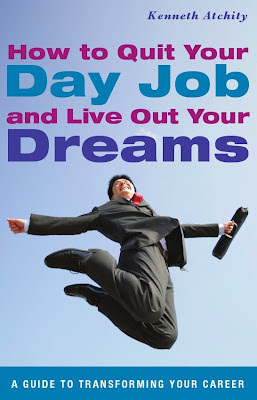 One of my favorite stories…I was on Dr. Joyce Brothers television show years ago with a couple of other people and one of them who was a man who was then in his 80’s and had just received his law degree from The University of Chicago. He told her that he was standing in line for registration four years earlier and one of the young people in line behind him said “Sir, are you sure you’re in the right line?” And he said “And I turned around and I said what line should I be in?”
One of my favorite stories…I was on Dr. Joyce Brothers television show years ago with a couple of other people and one of them who was a man who was then in his 80’s and had just received his law degree from The University of Chicago. He told her that he was standing in line for registration four years earlier and one of the young people in line behind him said “Sir, are you sure you’re in the right line?” And he said “And I turned around and I said what line should I be in?”And I thought “That is America. That’s the essence of America,” you are in whatever line you want to be in this country. And he fearlessly walked up and stood in the line and got his law degree at the age of 86 or whatever he was. And to me, what stands in people’s way is fear and their friends inflict it on them.One of the chapters in my book has to do with distinguishing between friends and friendly associates because when I left the academic world I had a few friends and I had lots of friendly associates. I learned the difference when I decided to leave because I retained a few friends. But most everybody I did not retain as friends because they thought I was absolutely crazy. They either thought that in kind of a benign way or they were just extremely angry that I was leaving a tenured position.
They thought that was completely ungrateful and crazy. I can also say that they were fearful about it and I knew them well enough to know that they were envious. They wished they could do it but they wouldn’t do it because they were set in their ways.
November 1, 2024
Quit Your Day Job and Live Out Your Dreams by Dr. Ken Atchity
In this Film Courage video, Dr. Ken Atchity (Author, Publisher, Producer), shares how his own pursuit of living his dreams spawned a book on the subject and what blocks most people's road to success.
AVAILABLE ON AMAZON
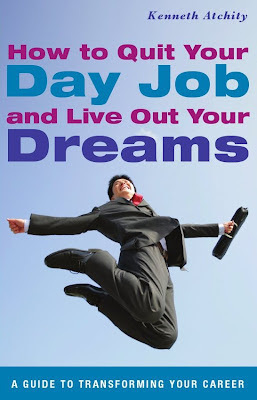
How to Quit Your Day Job and Live Out Your Dreams based on my own experience and that of others.
October 30, 2024
Book ReviewAVAILABLE ON AMAZONReviewed by Romuald Dzemo ...


AVAILABLE ON AMAZON
Reviewed by Romuald Dzemo for Readers' Favorite
Talmadge Farm by Leo Daughtry immerses readers in rural Southern life in the mid-20th century, offering a vivid portrait of its settings and characters. The Talmadge family is a fixture in the Eastern North Carolina community, and the story opens with their annual dove hunt. Beginning in September 1957, the narrative unfolds against the backdrop of Talmadge Farm—a sprawling estate encompassing hundreds of acres of tobacco fields and the imposing Talmadge mansion. Gordon Talmadge is a typical Southern patriarch obsessed with maintaining his family's legacy and fortune through the bank he controls. He cares very little about the welfare of the sharecroppers on his farm, especially the Sanders family, highlighting the stark contrasts between their privileged existence and the struggles of those bound to the land. The tension grows at different levels and escalates between Gordon and the Sanders family when Junior, Gordon’s son, attacks Ella Sanders. The fallout has dire ramifications.
Leo Daughtry has crafted a character-driven narrative with a solid historical setting. The characters are finely drawn, and watching them evolve through multiple conflicts is interesting. Gordon Talmadge is an ambitious man with domestic issues and hints at an underlying strain in his marriage with Claire, creating suspense. The dynamics between the Talmadges and the Sanders family, notably when sharecropping is at play, highlight the social and racial tensions and the disparity in their social standings, exacerbating misunderstandings and conflicts. Daughtry deftly illustrates the South's racial and class tensions, revealing how the social fabric frays when underlying injustices surface. The characters are not black-and-white caricatures but flawed individuals who react to their circumstances with varying degrees of morality. Talmadge Farm is an engaging tale that transports readers into an intriguing historical moment and place.
October 28, 2024
New From Story Merchant Books Ordinary People, Extraordinary Lives by Gregory J. Leeson
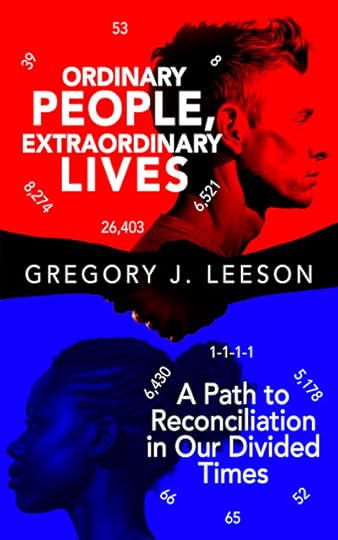
In his multi-layered work Ordinary People, Extraordinary Lives, Gregory J. Leeson delves deeply into the pervasive issue of societal divisiveness and asks how to get past it. To explore the roots of this division and find solutions, he embarked on an extensive 13-month, 26,403-mile road trip across North America. In visiting 53 cities in 39 states and eight provinces, Leeson delivered 19 speeches, conversed with nearly 1,000 people, and conducted in-depth interviews with 71 participants using a protocol developed by Dr. Dan P. McAdams, a pioneer in narrative psychology from Northwestern University.
The culmination of this remarkable odyssey is a collection of 66 succinct life stories, each potentially resonant with the reader’s own experiences, offering a window into the shared human condition. The book also features 52 viewpoints on the present state and future trajectory of the United States. In the chapter “What Would You Do,” Leeson presents thought-provoking questions, including a universal one, in a unique way that compels introspective responses.
Central to Leeson’s thesis is the assertion that despite our apparent differences, our fundamental similarities bind us together, fostering deeper connections with others. For those who embrace the opportunity to employ McAdams’ interview protocol, the journey promises a transformative and cathartic experience, enriching an understanding of oneself and others.
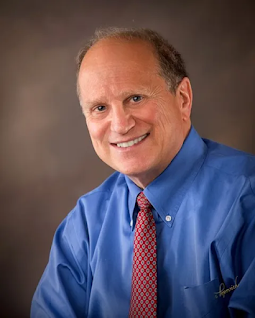 Gregory J. LeesonAuthor, Speaker, TED Talk Nominee
Gregory J. LeesonAuthor, Speaker, TED Talk NomineeOctober 25, 2024
CONGRATULATIONS Leo Daughtry Making the Long List for the 2024 Goethe Book Awards!

AVAILABLE ON AMAZON
"Talmadge Farm has often been described as a love letter to the South. Daughtry says, “Despite what the South has done and is doing, everybody loves the South. The South has a charm about it, and this book talks about the good parts of the South, how good the people are, and what the South has meant to so many of us… It’s a love story in many respects.”
It’s 1957, and tobacco is king. Wealthy landowner Gordon Talmadge enjoys the lavish lifestyle he inherited but doesn’t like getting his hands dirty; he leaves that to the two sharecroppers – one white, one Black – who farm his tobacco but have bigger dreams for their own children. While Gordon takes no interest in the lives of his tenant farmers, a brutal attack between his son and the sharecropper children sets off a chain of events that leaves no one unscathed. Over the span of a decade, Gordon struggles to hold on to his family’s legacy as the old order makes way for a New South.
October 23, 2024
Leo Daughtry Book Signing October 28th in Raleigh at NOFO at the PIG!
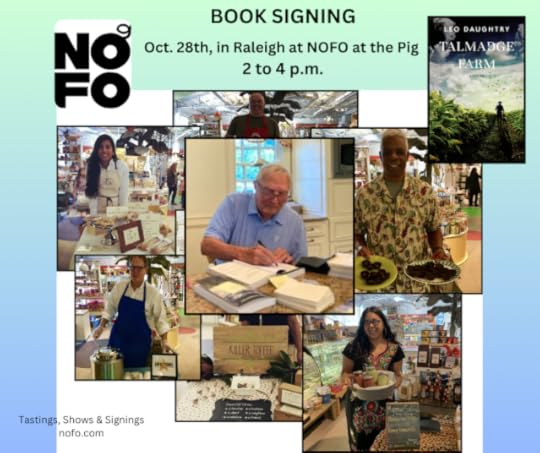

AVAILABLE ON AMAZON
"Talmadge Farm has often been described as a love letter to the South. Daughtry says, “Despite what the South has done and is doing, everybody loves the South. The South has a charm about it, and this book talks about the good parts of the South, how good the people are, and what the South has meant to so many of us… It’s a love story in many respects.”
It’s 1957, and tobacco is king. Wealthy landowner Gordon Talmadge enjoys the lavish lifestyle he inherited but doesn’t like getting his hands dirty; he leaves that to the two sharecroppers – one white, one Black – who farm his tobacco but have bigger dreams for their own children. While Gordon takes no interest in the lives of his tenant farmers, a brutal attack between his son and the sharecropper children sets off a chain of events that leaves no one unscathed. Over the span of a decade, Gordon struggles to hold on to his family’s legacy as the old order makes way for a New South.



